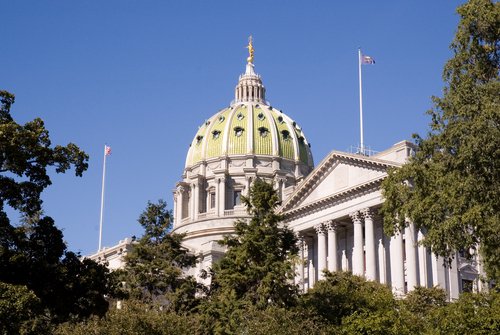
The Pennsylvania Senate passed a bill on Wednesday requiring legislative approval before the state can enter into the Regional Greenhouse Gas Initiative (RGGI), which would impose a carbon tax on electric generation companies, manufacturers and other industries operating within Pennsylvania.
The Senate passage of the bill, House Bill 2025, follows approval of the measure in the House of Representatives on July 8. The legislation, which passed with bipartisan votes, now moves to Gov. Tom Wolf, who is expected to veto it.
Wolf issued an executive order on Oct. 3, 2019 directing the Department of Environmental Protection (DEP) to enter into RGGI by 2022. RGGI sets a regional cap on the amount of carbon dioxide (CO2) pollution power plants can emit and also would essentially establish a carbon tax on fossil fuel users for the CO2 emissions.
“This bill gives a voice back to the people by allowing those of us who represent them to have a say in this process,” said state Rep. Jim Struzzi (R-Indiana), who introduced H.B. 2025 in the House.
Opponents say the tax would cause power plants to close, costing thousands of jobs, and would ultimately harm Pennsylvania residents and businesses. The Air Quality Technical Advisory Committee and the Citizens Advisory Council, both part of DEP, recommended against Pennsylvania joining RGGI.
“Given Pennsylvania is already ahead of the carbon dioxide reduction goals established under the governor’s Climate Action Plan, why would we want to jeopardize thousands of Pennsylvania jobs and trigger significantly higher electricity rate increases when the existing competitive market has already achieved these gains?,” Rep. Struzzi said.
Pennsylvania Chamber of Business and Industry President and CEO Gene Barr said the governor’s decision to direct DEP to join RGGI could have a major negative impact on the state’s energy and manufacturing sectors.
“As we have noted before, Pennsylvania would not be well-served if, as a result of this policy, the generation of electricity simply moves to a non-RGGI state, leaving us with less economic activity but no net change in emissions on a regional basis,” Barr said. It’s important to preserve Pennsylvania’s role as an energy exporter, he added, and to recognize the steps the state has already taken to significantly reduce greenhouse gas emissions.
The Power PA Jobs Alliance, a coalition of labor, management, and consumer stakeholders that oppose state proposals to impose carbon dioxide emission taxes, applauded the bill’s passage.
“Joining RGGI does nothing to reduce carbon dioxide emissions, it merely exports the production of affordable, reliable and resilient electricity to Ohio and West Virginia, where fossil-fueled power plants aren’t taxed, and exports Pennsylvania jobs to those states too,” the Power PA Jobs Alliance said. “If Pennsylvania were to join RGGI, consumers and businesses would bear the burden of higher power prices, while local governments and school districts would suffer lost tax revenues from prematurely closed plants.”
In addition, the bill calls for a public comment period focusing on the regions of the state that would be impacted, including consideration of the economic and fiscal impacts in those regions, the group noted.